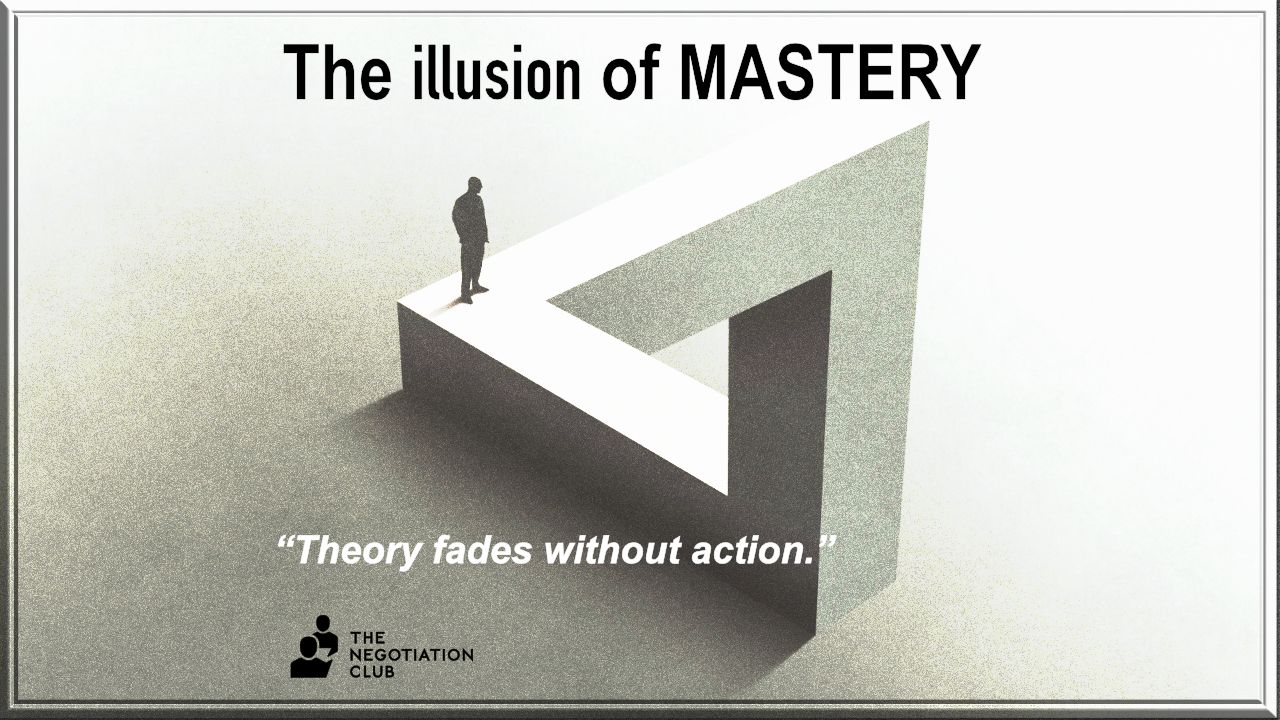
Why Practice Beats Training: The Real Path to Negotiation Mastery
Many people seeking to improve their negotiation skills turn to training courses. These promise powerful techniques and strategies—sometimes in just a day. And while they can introduce important concepts, they rarely provide the *practical, repeatable experience* needed to truly master the skill.
Negotiation is not a checklist of tactics—it's a dynamic, adaptive skill. Like any skill, it needs consistent practice, feedback, and reflection. This is where traditional one-off courses fall short, and where a regular practice environment, like *The Negotiation Club*, offers real transformation.
The Limitations of One-Off Negotiation Courses
1. Information Overload Without Application
A typical course crams hours of theory into a single session. Participants walk away with pages of notes but few chances to apply what they’ve learned. According to research on the "forgetting curve," we forget much of what we don’t use—often within days.

IMAGE: "The Forgetting Curve was introduced by Hermann Ebbinghaus"
2. Limited Feedback, Minimal Personalisation
Group exercises are common, but individual feedback is rare. Most courses can’t dive into your personal negotiation habits or offer tailored guidance on what to improve.
3. No Space to Make Mistakes Safely
You can’t learn without failing—but failing in real negotiations is costly. Most training doesn’t give space to test new techniques, stumble, adjust, and grow.
4. Static Curriculum vs. Real-World Dynamics
Courses follow a fixed agenda. But real negotiations are unpredictable. There’s no curriculum for how someone reacts emotionally to your proposal or the subtle signals you might miss. Practice is how you develop flexibility.
The Power of Regular Practice in Negotiation Clubs
At The Negotiation Club, we don’t teach negotiation... we train it! Regular practice sessions give participants the chance to:
- Apply techniques repeatedly through structured simulations using Negotiation Cards (1, 2, or 6 variables)
- Receive continuous, specific feedback from peers and observers
- Experiment with different tactics in a safe, low-stakes environment
- Build resilience and adaptability by navigating unpredictable scenarios
- Develop intuitive responses rather than relying on scripted techniques
Negotiation clubs mirror the development methods of athletes and musicians—focused repetition, observation, and micro-adjustments.
One standout feature of club practice is the use of observation roles and team negotiation formats, where each participant has a distinct job: Spokesperson, Observer, Analyst, Decision-Maker. These aren’t just activities—they’re deliberate drills designed to sharpen key negotiation muscles.
Practice your skills for FREE!
Knowledge vs. Skill: The Application Gap
Understanding terms like BATNA, ZOPA, or anchoring is a great start. But that’s all it is—a start. It’s like reading a book about swimming without ever getting in the water.
Negotiation muscle memory is what bridges the gap. It forms when you rehearse tactics so often they become instinctive. In real conversations, you don’t stop to recall theory—you respond fluently, adapt quickly, and stay present.
Regular club-based practice gives space to:
- Try different openings and test reactions
- Watch how others handle pressure and pushback
- Learn to deal with both logical and emotional rejections
- Practice summarising, clarifying and probing in real time
The Confidence Curve
Consistent practice doesn’t just make you better—it makes you bolder. Each session chips away at self-doubt and builds trust in your own ability. Even a failed negotiation in a club setting becomes fuel for progress.

GRAPH: The Dunning–Kruger Effect Clearly Demonstrates the Power Of Negotiation Practice
... And as confidence grows, so does curiosity. Members begin to experiment more, take risks, and fine-tune their style. That’s how true skill emerges: not from a book, but from doing the work, again and again.
Final Thought: If You're Serious About Getting Better…
Negotiation courses can give you the map. But only regular, purposeful practice can teach you how to navigate. At The Negotiation Club, we offer more than lessons—we offer a training ground.
If you want to:
- Improve your skill under pressure
- Build negotiation confidence
- Receive real feedback on your techniques
- Join a community of committed negotiators
…then stop reading about negotiation.... and start practicing it!
About the Author Philip Brown

Phil Brown is the founder of The Negotiation Club, a training organisation built on the belief that negotiation is a skill developed through practice, not theory. With 30 years of procurement and commercial experience, Phil now helps professionals worldwide build confidence and fluency through structured, repeatable negotiation practice. Experience Phils unique negotiation practice at a FREE NEGOTIATION TASTER ....



